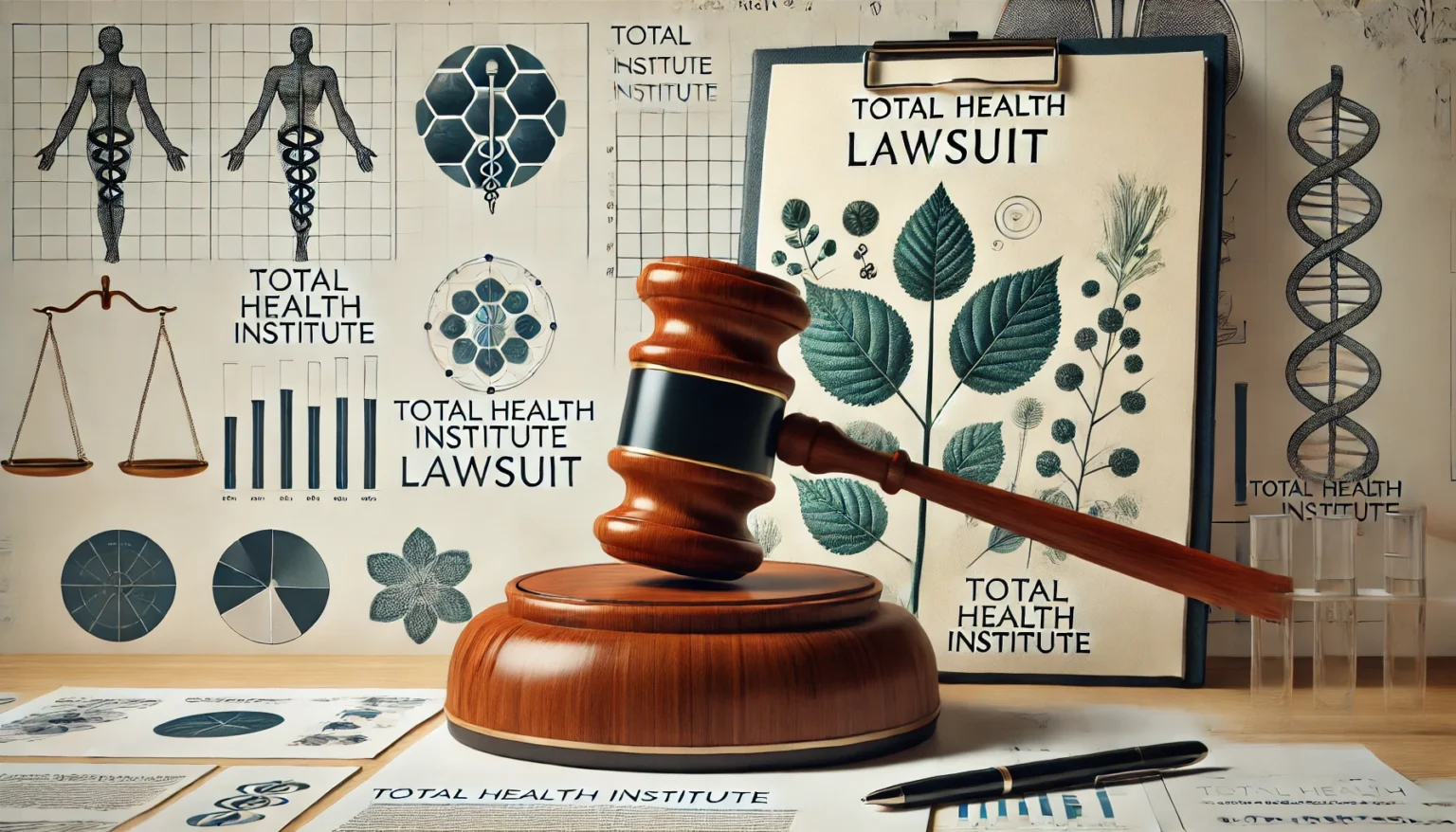The Total Health Institute lawsuit has brought significant attention to the practices and claims of this alternative health organization. Known for offering holistic and integrative treatments, the institute now faces legal scrutiny that has raised questions about patient safety, ethical standards, and business practices.
At the heart of the Total Health Institute lawsuit are allegations from patients and regulators regarding misleading claims and potential harm caused by its services. These accusations have not only impacted the institute’s reputation but also sparked broader discussions about accountability in alternative medicine.
As the Total Health Institute lawsuit progresses, it highlights the need for transparency and ethical practices in healthcare. This case serves as a pivotal moment for examining how such institutions operate and their responsibilities toward patient care.
What Sparked the Total Health Institute Lawsuit?
The Total Health Institute lawsuit originated from growing concerns over the safety and effectiveness of the treatments offered by the organization. Patients began to report dissatisfaction with the results and questioned the validity of the institute’s health claims.
Allegations included accusations of misleading advertising and unproven medical claims. Critics argued that the institute promoted alternative treatments without adequate scientific backing, leading to skepticism and eventual legal scrutiny.
Regulators and healthcare watchdogs began investigating these claims. They aimed to determine whether the institute’s practices adhered to legal and ethical standards. This examination brought additional attention to the Total Health Institute lawsuit and further complicated its reputation.
A turning point came when former patients filed formal complaints. These grievances provided the foundation for the lawsuit and amplified the public’s awareness of the case.
Services Offered and Criticisms Faced by the Institute
The Total Health Institute offers a range of alternative treatments, focusing on holistic approaches such as detoxification, nutritional counseling, and spiritual healing. These methods are marketed as complementary solutions for chronic illnesses and diseases.
Critics of the institute point out that these treatments often lack peer-reviewed scientific validation. Some patients felt misled by promises of complete healing, which were not delivered.
Table: Common Services and Associated Criticisms
|
Service |
Description |
Criticism |
|
Detoxification Therapy |
Claims to cleanse the body |
Lacks strong scientific evidence |
|
Nutritional Counseling |
Tailored dietary plans |
Results not consistently effective |
|
Spiritual Healing |
Focus on mental-spiritual health |
Questionable efficacy for physical ailments |
The lack of clinical trials for many of these services has also drawn criticism. Despite the controversies, some patients continue to vouch for the effectiveness of the treatments.
Legal Background of the Total Health Institute Lawsuit
The Total Health Institute lawsuit formally began after an accumulation of complaints was submitted to legal authorities. It was alleged that the institute violated consumer protection laws by making exaggerated health claims.
This case became notable due to its emphasis on accountability within alternative healthcare providers. Legal documents revealed discrepancies between the institute’s promotional materials and the actual outcomes experienced by patients.
During the initial hearings, both the plaintiffs and the institute presented conflicting views on the legitimacy of the services offered. These arguments set the stage for a prolonged legal battle, raising complex questions about healthcare regulation.
Patient Allegations and Key Legal Claims
Patients involved in the Total Health Institute lawsuit alleged that the institute failed to deliver on its promises. They claimed that the treatments, despite being expensive, did not result in the health improvements advertised.
A significant portion of the claims revolved around the institute’s use of unlicensed therapies. Patients argued that the lack of professional oversight contributed to ineffective or harmful treatments.
Additionally, legal claims focused on deceptive advertising. Plaintiffs cited examples of promotional materials that guaranteed success, which was not substantiated by evidence or patient experiences.
Bullet Points for Allegations:
- Misrepresentation of treatment outcomes.
- Use of therapies without adequate clinical support.
- Failure to provide refunds despite dissatisfaction.
The Role of Regulators in the Total Health Institute Lawsuit
Regulatory agencies played a pivotal role in the Total Health Institute lawsuit, investigating the institute’s compliance with healthcare standards. Agencies like the FDA and FTC reviewed the claims made about the institute’s services.
One key area of investigation was the labeling and marketing of treatments. Regulators examined whether the institute’s practices aligned with advertising guidelines.
Regulators also ensured that patient complaints were thoroughly reviewed. Their findings were critical in determining whether the institute operated within the bounds of ethical healthcare.
Impact of the Lawsuit on Total Health Institute’s Reputation
The Total Health Institute lawsuit significantly tarnished the organization’s public image. Once viewed as a leader in holistic health, the institute faced a wave of criticism that led to declining trust among its patients.
Media coverage of the case further amplified the damage. News outlets highlighted patient stories, creating widespread awareness of the lawsuit.
The institute attempted to counter this negative press by emphasizing its commitment to improving its practices. However, the damage to its reputation proved difficult to repair in the short term.
Key Developments in the Legal Proceedings
Several key milestones have defined the progress of the Total Health Institute lawsuit. Early in the case, mediation attempts were made to resolve disputes, but they proved unsuccessful.
In the discovery phase, evidence such as patient testimonials and internal communications was presented, offering a deeper look into the institute’s operations.
The lawsuit also brought attention to broader regulatory gaps in alternative healthcare, making it a landmark case in the industry.
Chart: Timeline of Legal Proceedings
|
Year |
Key Development |
|
2022 |
Initial complaints filed |
|
2023 |
Regulatory investigations begin |
|
2024 |
Trial begins, evidence presented in court |
As the trial progresses, the outcome of the case is expected to have lasting implications for both the institute and the alternative health sector.
Changes in Institute Practices Post-Lawsuit
In the aftermath of the Total Health Institute lawsuit, the organization implemented a series of changes to address the concerns raised during the legal proceedings. These changes aimed to rebuild trust and ensure compliance with healthcare regulations.
One notable adjustment was the enhancement of patient consent protocols. The institute introduced more detailed documentation to clearly outline the potential risks and limitations of treatments.
Staff qualifications were also reviewed and improved. Additional training programs were initiated to ensure that practitioners met professional healthcare standards.
Table: Changes Implemented by the Institute
|
Change |
Description |
|
Enhanced Consent Protocols |
Improved transparency in treatment risks |
|
Practitioner Training |
Focused on licensing and professional ethics |
|
Marketing Revisions |
Reduced exaggerated claims in advertisements |
These changes reflect an effort to address the criticisms that formed the basis of the lawsuit while demonstrating a commitment to ethical practices.
The Broader Implications for Alternative Medicine Providers
The Total Health Institute lawsuit highlighted critical issues faced by alternative medicine providers, prompting a reevaluation of industry standards.
The case underscored the importance of evidence-based practices. Providers are increasingly pressured to validate their treatments with scientific research to gain public trust.
Additionally, the lawsuit set a precedent for legal accountability. Other alternative health providers now face greater scrutiny from regulators and patients alike.
Bullet Points for Implications:
- Greater emphasis on scientific validation of treatments.
- Increased regulatory oversight for alternative healthcare.
- Enhanced patient awareness and skepticism about exaggerated health claims.
This case serves as a wake-up call for the entire industry, signaling a need for stricter self-regulation and transparency.
Patient Safety Concerns Raised by the Total Health Institute Lawsuit
Patient safety emerged as a key focus of the Total Health Institute lawsuit, with numerous allegations pointing to inadequate safeguards in treatment protocols.
Many patients reported adverse effects from unproven therapies, which lacked appropriate clinical trials. The absence of licensed medical professionals supervising treatments further compounded safety concerns.
A lack of transparency regarding potential risks was another issue. Patients alleged that they were not fully informed about the limitations or side effects of the institute’s methods.
This lawsuit has brought renewed attention to the ethical responsibility of healthcare providers to prioritize patient well-being over financial gains.
Ethical and Legal Lessons for the Healthcare Industry
The Total Health Institute lawsuit offers valuable ethical and legal lessons for both conventional and alternative healthcare providers.
One major takeaway is the importance of truthful marketing. Exaggerated claims can lead to legal repercussions and damage public trust.
Another lesson involves the necessity of informed consent. Clear communication with patients about treatment risks and benefits is critical to maintaining ethical standards.
Chart: Key Lessons for Healthcare Providers
|
Lesson |
Description |
|
Honest Marketing |
Avoid making unsupported claims |
|
Informed Consent |
Ensure patients understand risks and benefits |
|
Regulatory Compliance |
Adhere strictly to industry standards |
The case also highlights the need for providers to maintain proper licensing and credentials for staff to avoid legal liabilities.
Outcomes of the Total Health Institute Lawsuit and Settlements
The Total Health Institute lawsuit resulted in significant legal and financial outcomes for the organization. The court mandated compensation for affected patients, acknowledging the harm caused by unfulfilled promises.
The institute agreed to revise its marketing strategies to eliminate misleading health claims. This settlement condition aimed to prevent future incidents of consumer deception.
Additionally, the lawsuit served as a regulatory milestone. It encouraged authorities to establish stricter guidelines for alternative medicine providers, ensuring greater accountability.
While the financial penalties were substantial, the reputational damage to the institute was perhaps the most profound consequence.
Future Prospects for Total Health Institute Post-Lawsuit
Following the lawsuit, the Total Health Institute faces the challenge of rebuilding its reputation and restoring public trust. This involves adopting a more transparent and patient-focused approach to healthcare.
Efforts to collaborate with medical professionals are underway, aiming to integrate evidence-based practices into the institute’s offerings. This shift may help mitigate skepticism about its treatments.
The institute also plans to engage in public outreach initiatives, educating the community about its revised practices and commitment to ethical standards.
While the road to recovery is long, the institute’s willingness to adapt and learn from its mistakes offers hope for a more credible and responsible future.
Last Word
The Total Health Institute lawsuit has become a pivotal case in the realm of alternative healthcare, highlighting the need for greater accountability and transparency. While the institute has taken steps to address the issues raised, the broader implications of the lawsuit continue to influence public perception and industry practices.
For patients, this case serves as a reminder to critically evaluate healthcare providers and demand evidence-based treatments. For the institute, it represents an opportunity to rebuild trust and set a higher standard in the alternative medicine field.
Ultimately, the Total Health Institute lawsuit underscores the importance of ethical practices and patient safety in all areas of healthcare, offering valuable lessons for providers and regulators alike.




